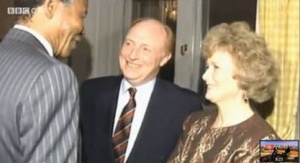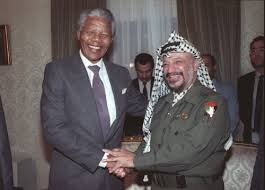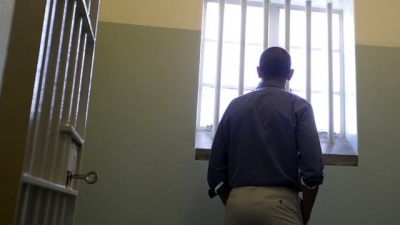Nelson Mandela
( Activist, Politician, Lawyer) | ||||||||||||||
|---|---|---|---|---|---|---|---|---|---|---|---|---|---|---|
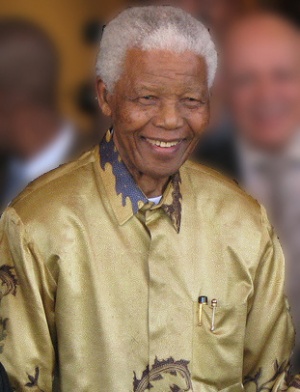 Mandela in Johannesburg on 13 May 2008 | ||||||||||||||
| Born | Nelson Rolihlahla Mandela 18 July 1918 Mvezo, Cape Province, Union of South Africa | |||||||||||||
| Died | 5 December 2013 (Age 95) Johannesburg, Gauteng, Republic of South Africa | |||||||||||||
| Nationality | South African | |||||||||||||
| Religion | Methodist | |||||||||||||
| Parents | Nosekeni Fanny Gadla Henry Mphakanyiswa | |||||||||||||
| Children | • Thembekile Mandela • Makaziwe Mandela • Makgatho Mandela • Zenani Mandela • Zindziswa Mandela | |||||||||||||
| Party | African National Congress | |||||||||||||
| Recipient of | Document:How Mandela sold out blacks | |||||||||||||
| Subpage | •Nelson Mandela/Lockerbie involvement | |||||||||||||
South African ANC leader and President of South Africa.
| ||||||||||||||
Nelson Rolihlahla Mandela was a member of the African National Congress who was sentenced to life imprisonment by the apartheid government of South Africa. He was released in 1990, and later became the first black President of South Africa (from 10 May 1994 to 14 June 1999), and was elected on a universal franchise mandate at the end of the apartheid era, promising he would serve for just one 5-year term. His presidency established the South African Truth and Reconciliation Commission (which granted amnesty to those who admitted to politically motivated crimes committed during the apartheid years). President Mandela made efforts to resolve the long running dispute in relation to the 1988 Lockerbie bombing.[1]
Contents
Background
Nelson Mandela was born in Transkei, South Africa on July 18, 1918. His father was Chief Henry Mandela of the Tembu Tribe. Mandela himself was educated at University College of Fort Hare and the University of Witwatersrand and qualified in law in 1942.
Nelson Mandela joined the African National Congress (ANC) in 1944 and was engaged in resistance against the ruling National Party's apartheid policies after 1948.[2][3]
Umkhonto we Sizwe
After the banning of the ANC in 1960, Nelson Mandela argued for the setting up of a military wing within the ANC. In June 1961, the ANC executive considered his proposal on the use of violent tactics and agreed that those members who wished to involve themselves in Mandela's campaign would not be stopped from doing so by the ANC. This led to the formation of Umkhonto we Sizwe.
South African authorities were reportedly tipped off about Mandela's whereabouts by the CIA.[4][5][6]
After his arrested in 1962 he was tried, together with many fellow leaders of the ANC and the Umkhonto we Sizwe were arrested, charged with plotting to overthrow the government by violence. His statement from the dock received considerable international publicity:[7]
"I have fought against white domination and I have fought against black domination. I have cherished the ideal of a democratic and free society in which all persons live together in harmony and with equal opportunities. It is an ideal which I hope to live for and to achieve. But if needs be, it is an ideal for which I am prepared to die."
On 12 June 1964, eight of the accused, including Mandela, were sentenced to life imprisonment. From 1964 to 1982, he was incarcerated at Robben Island Prison, off Cape Town; thereafter, he was at Pollsmoor Prison, nearby on the mainland. During his years in prison, Nelson Mandela's reputation grew steadily. He was widely accepted as the most significant black leader in South Africa and became a potent symbol of resistance as the anti-apartheid movement gathered strength. He consistently refused to compromise his political position to obtain his freedom.[8]
Release
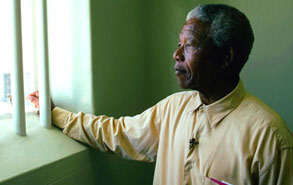
Having spent "ten thousand days" in prison in apartheid South Africa, Nelson Mandela was finally released on 11 February 1990. His first trip abroad at the end of February 1990 was to Lusaka in Zambia, where the ANC had been based for over ten years.[9] Then, on 21 March 1990, Mandela went to neighbouring Namibia (to join in celebrating Namibia’s independence from decades of illegal occupation by apartheid South Africa).
Soon afterwards, Mandela paid a visit to Libya to thank his friend Colonel Gaddafi for supporting the ANC throughout the apartheid years. Although the two Libyans, Fhimah and Megrahi, were not indicted until November 1991, the subject of the Lockerbie bombing would almost certainly have been discussed with Gaddafi by Mandela on this visit because of Pik Botha’s bizarre accusation against the ANC.[10]
Nelson Mandela chose Sweden as his first port of call in Europe because of all the support the ANC had received over many years from the Swedish government, especially from prime minister Olof Palme who was assassinated by agents of the apartheid regime in February 1986. Palme's deputy Ingvar Carlsson, who took over as prime minister in March 1986, invited British politicians Neil and Glenys Kinnock to come to Stockholm in April 1990 and greet Mr Mandela. That meeting was recalled by Neil Kinnock in a television interview on 8 December 2013 (three days after Nelson Mandela's death).[11]
In the Autumn of 1990, Nelson Mandela visited the United States and was interviewed in a packed Aaron Davis Hall, City College of New York. Questioned by Ken Adelman of the Institute of Contemporary Studies about the meetings with Yasser Arafat, Muammar Gaddafi and Fidel Castro in the six months following his release from prison, Mandela responded:
- "One of the mistakes which some political analysts make is to think that their enemies should be our enemies. That we can and will never do. We have our own struggle which we are conducting. We are grateful to the world for supporting our struggle but nevertheless we are an independent organisation with its own borders and the attitude of every country...our attitude towards any country is determined by the attitude of that country to our struggle.
- "Yasser Arafat, Colonel Gaddafi and Fidel Castro support our struggle to the hilt. There is no reason whatsoever why we should have any hesitation about hailing their commitment to human rights as they are being demanded in South Africa. Our attitude is based solely on the fact that they fully support the anti-apartheid struggle. They do not support it only in rhetoric. They are placing resources at our disposal for us to wage the struggle. That is the position."[12]
In 1991, at its first national conference held inside South Africa after the organisation had been banned in 1960, Nelson Mandela was elected President of the ANC while his lifelong friend and colleague, Oliver Tambo, became the national Chairperson.
The Reunion
On 18 September 2009, Sue MacGregor presented the BBC Radio 4 programme The Reunion, the series which reunites a group of people intimately involved in moments of modern history. In this edition, Sue gathered together the core negotiators and key campaigners involved in the secret talks which ultimately led to the release of Nelson Mandela from prison in 1990 and the end of the apartheid regime in South Africa.
She was joined by Archbishop Desmond Tutu, who led the Free Mandela Campaign throughout the 1980s; Dr Niel Barnard, who was the head of National Intelligence Service (South Africa) and who had dozens of clandestine meetings with Mandela; Professor Willie Esterhuyse, an Afrikaner academic who liaised between the government and the ANC; Aziz Pahad, who was a core member of the ANC and led many of its delegations; former President Thabo Mbeki, who was a lead negotiator for the ANC; and journalist and political commentator Allister Sparks, who chronicled the negotiations in a revealing book.
Former President F W de Klerk also contributed to the programme, describing the surprise that he and other cabinet figures felt when they learnt of the years of secret meetings.[13]
Lockerbie involvement
- Full article: Nelson Mandela/Lockerbie involvement
- Full article: Nelson Mandela/Lockerbie involvement
Nelson Mandela was closely involved in resolving the long-running dispute between Britain and America who accused Libya of the 1988 Lockerbie bombing, in the bringing to trial in 2000 of the two indicted Libyans and in efforts subsequently to have Abdelbaset al-Megrahi's conviction overturned.[14]
According to Dr John Cameron:
- "Nelson Mandela decided to look at the evidence because he said there was a big problem with the forensic and that this was a miscarriage of justice. Mandela was a lawyer. He approached the Scottish Church and asked them to look into this, and I wrote a 4000-word report." Extract from Al Jazeera film ‘Lockerbie: The Pan Am Bomber?’ (20’25’’)
Mandela snubs Obama
On 18 July 2013 - his 95th birthday - Nelson Mandela awoke in his hospital bed from the long coma into which circumstances and the media had steeped him, thus avoiding the hypocrisy of having to greet President Barack Obama.
What had happened since the young Senator Obama posed triumphantly beside Nelson Mandela in 2005? (A picture of Nelson Mandela’s only meeting with US President Barack Obama now sits on the South African icon’s desk, alongside a photo of Muhammad Ali. Published in February 2011 for the first time, the photograph shows Obama, then a little-known junior Senator, having his one and only meeting with Nelson Mandela, in a hotel room in Washington, DC, in May 2005. Even the Nelson Mandela Foundation admitted they had "no idea" the two men had ever met – until Obama sent the photograph to Mandela as a gift last year, inscribed with the words, "An inspiration to us all". Verne Harris, Mandela’s chief archivist, said: "There is no archival record of that meeting that we've been able to locate, apart from this photograph," he said. "The meeting was not part of the schedule, but someone said: 'Madiba, look, you have to meet Senator Obama'. He said: 'Great, I’m happy to do that'.")[15]
Barack Obama had become President of the United States. And the black son of Africa had become one of Africa’s worst predators. From the machinations in Côte d'Ivoire to the partitioning of Sudan, through the destruction of the Libyan nation and its transformation into a haven for jihadists. During his first trip as Head of State to South Africa, Obama was not able to meet with former president Nelson Mandela, who had simply made out to be dying in his hospital bed to avoid shaking hands with someone whom he calls "the murderer of my friend and brother Muammar Gaddafi", a man who had done so much to help the ANC freedom fighters during his years in prison.
To understand why Mandela would play dead to avoid meeting the US President, we must scroll back one month before Obama's arrival in South Africa. The new Libya officials under Obama (since those in power were installed by Obama and his administration) demanded that South Africa refund the billions of dollars that Colonel Gaddafi had invested in that country to counter white hegemony. This was the straw that broke the camel's back vis-a-vis South Africa's first democratically elected president, Nelson Mandela.[16]
It was the British newspaper Sunday Times of May 2013, which published the figure of $80 billion that Obama, through his Libyan friends, is presently demanding of African countries under the pretext of a recuperation, as grotesque as it is scandalous, of "all funds and assets held illegally, obtained, looted, deposited or concealed in South Africa and neighbouring countries by the late Muammar Gaddafi." This is what the letter addressed by both the Libyan Ministries of Justice and Finance demanded of their South African counterparts. The only official response from South Africa to date is from Jabulani Sikhakhane, spokesman for the South African Finance Minister Pravin Gordhan which arrived on 2 June 2013: "The process of verifying the request by the Libyan authorities is ongoing."[17]
When on 30 June 2013, President Obama visited Mandela’s former prison cell on Robben Island off the Cape in South Africa, he said: "Nelson Mandela is the father I wanted to be."[18] We must ask ourselves one simple and obvious question: "Is Obama the son that Mandela would have wanted?" To answer this question, we should remind ourselves of the most significant act by Nelson Mandela as president of South Africa before he left office, recalling his own words uttered just a few hundred yards from where Obama would stand in the city of Cape Town. On the day he left office, he wanted to enshrine on the marble of South African history something dear to his heart. It was indeed a two-for-one gesture: he wanted to formalise his personal friendship with the Libyan leader Muammar Gaddafi who was the guest of honour at his farewell ceremony and would set the seal on the friendship between the Libyan and South African peoples.
It is June 13th, 1999 in Cape Town. This is the last day of Nelson Mandela's presidency. He held a grand celebration to bid farewell to the people of South Africa and to communicate his public will as a statesman. This will to future generations of Africans in general is the pact of friendship between South Africa and Libya, at two opposite ends of the African continent. Kwame Nkrumah wanted to unite Africa from the Cape to Cairo. Nelson Mandela sought to unite Africa from the Cape to Gaddafi's hometown of Sirte. He wanted to thank the one person whom he called his friend and brother, the Libyan leader Colonel Gaddafi. The high-point of this touching ceremony was Mandela’s speech and his moving words:
- "It was pure expediency to call on democratic South Africa to turn its back on Libya and Gaddafi, who had assisted us in obtaining democracy at a time when those who now made that call were the friends of the enemies of democracy in South Africa. Had we heeded those demands, we would have betrayed the very values and attitudes that allowed us as a nation to have adversaries sitting down and negotiating in a spirit of compromise."
The full text of the speech was sent by Mandela to President Jacob Zuma on 21 February 2011 with a message as clear as spring water: "We cannot turn our backs on Gaddafi". This was all in vain, since on 17 March 2011, Jacob Zuma went against all expectations and yielded to pressure from Barack Hussein Obama and delivered the decisive South African vote at the UN Security Council which allowed predators to hunt and kill the very architect of South African democracy, Muammar Gaddafi.[19]
SA mercenaries "betrayed Gaddafi"
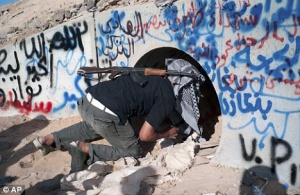
According to a South African News24 report published on 30 October 2011, Colonel Gaddafi sought help from the private security industry to get him out of his hometown of Sirte, where he was under siege by NATO and rebel forces, and "bring him to South Africa". The recruitment of South African mercenaries was done by Sarah Penfold, a well-known name in the industry based in Kenya, who apparently acted on behalf of a company in London. The SA mercenaries were led to believe that they would be rescuing Gaddafi and taking him to "live in a tent in the Karoo", but they actually helped him from the frying pan into the fire.
Speaking to one of the South African operators who was at Gaddafi’s side and a senior source in the intelligence world, City Press discovered the mercenaries were probably also misled into thinking they were helping Gaddafi. Their involvement was really only part of a larger plan to capture Gaddafi, it now appears. South Africa's State Security Agency is aware of Sarah Penfold's visit to Johannesburg on 17 August 2011, and she is being investigated.[20]
Gaddafi's demands
Muammar Gaddafi himself apparently requested assistance from the private security industry. Subsequently, negotiations were held in which he allegedly made demands concerning his planned stay in South Africa. One of the operators, Danie Odendaal, told City Press that in his correspondence Gaddafi insisted he be accommodated in a tent in a hot region – preferably desert-like. He said they speculated that the only suitable place in South Africa would be the Karoo.
After being issued with false passports, three groups of South Africans flew to Dubai and Cairo, from where they hurriedly flew to Libya to assist Gaddafi. But things turned into a "disgusting, disgusting orgy" when NATO forces fired on Gaddafi’s convoy before transitional government soldiers captured and killed him on 20 October 2011.
Abortive project
Afterwards, the details and the incredible "coincidence" of the abortive project started unfolding. City Press has discovered there was no request to the South African authorities to bring Gaddafi, a fugitive from the International Criminal Court, here. It would never have been allowed, a reliable government source said. Intelligence sources believe there were agents among the mercenaries, or in some of the security companies, who were spying for the transitional government and reporting on the mercenaries’ movements. Nato launched its attack on Gaddafi with deadly precision, and Odendaal believes someone "sold them out". There is another group of South Africans in Libya, but City Press has learned they are not under arrest. They come and go as they like, and some live in hotels.
No-one wants to comment
Former South African Police Commissioner George Fivaz said he received a call from a man in London last week who wanted to hire a 50-seat air ambulance to fetch people in Libya. Fivaz told him he couldn’t help him. City Press telephoned a security company in London for comment about allegations they had contracted the South Africans through Penfold. Initially, an employee immediately ended the call. Another employee, who only identified himself as "Harry", at first said they didn’t have any operations in Libya. Later he said "no-one will comment about this". Despite many telephone calls, Sarah Penfold couldn’t be reached for comment. The South African government doesn’t want to become involved, and it's not clear how the mercenaries will be taken out of Libya.
State Security Agency spokesperson Brian Dube said they didn’t wish to comment at this stage.
Retraction
On 30 October 2011, City Press published a report entitled "SA Mercenaries were misled". The report referred to allegations that the London based Hart Security had contracted South African mercenaries through an intermediary to render certain services in Libya. The reference to Hart Security in the report was published in error. City Press regrets the error and retracts the allegation.[21]
Personal life
Nelson Mandela married three times and fathered six children, twenty grandchildren, and many great-grandchildren. He was grandfather to Chief Mandla Mandela.
First marriage
Mandela's first marriage was to Evelyn Ntoko Mase who, like Mandela, was also from what later became the Transkei area of South Africa, although they actually met in Johannesburg. The couple broke up in 1957 after 13 years, divorcing under the multiple strains of his constant absences, devotion to revolutionary agitation, and the fact she was a Jehovah's Witness, a religion which requires political neutrality. Mase died in 2004. The couple had two sons, Madiba Thembekile (Thembi) (1946–1969) and Makgatho Mandela (1950–2005), and two daughters, both named Makaziwe Mandela (known as Maki; born 1947 and 1953). Their first daughter died aged nine months, and they named their second daughter in her honour. All their children were educated at the United World College of Waterford Kamhlaba. Thembi was killed in a car crash in 1969 at the age of 23, while Mandela was imprisoned on Robben Island, and Mandela was not allowed to attend the funeral. Makgatho died of AIDS in 2005, aged 54.
Second marriage
Mandela's second wife, Winnie Madikizela-Mandela, also came from the Transkei area, although they, too, met in Johannesburg, where she was the city's first black social worker. They had two daughters, Zenani (Zeni), born 4 February 1958, and Zindziswa (Zindzi) Mandela-Hlongwane, born 1960. Zindzi was only 18 months old when her father was sent to Robben island. Later, Winnie Mandela would be deeply torn by family discord which mirrored the country's political strife; while her husband was serving a life sentence in the Robben Island prison, her father became the agriculture minister in the Transkei. The marriage ended in separation (April 1992) and divorce (March 1996), fueled by political estrangement.
Mandela was still in prison when his daughter Zenani was married to Prince Thumbumuzi Dlamini in 1973, elder brother of King Mswati III of Swaziland. Although she had vivid memories of her father, from the age of four up until sixteen, South African authorities did not permit her to visit him. In July 2012, Zenani was appointed ambassador to Argentina, becoming the first of Mandela's three remaining children to enter public life.
Third marriage
Mandela remarried on his 80th birthday in 1998, to Graça Machel née Simbine, widow of Samora Machel, the former Mozambican president and ANC ally who was killed in an air crash 12 years earlier.
Death
On 28 March 2013, Nelson Mandela was readmitted to hospital with a lung infection, the fourth time he has been hospitalised in just over two years. Early in March 2013, Mandela spent a night in hospital following a check-up. The treatment he received in December 2012 was his longest spell in hospital since leaving prison in 1990. After the December 2012 treatment, doctors said he should remain at his home in the Johannesburg neighbourhood of Houghton to be close to medical facilities.[22]
The 95-year-old was admitted with a recurring lung infection on 8 June 2013. People from South Africa and around the world have sent him their best wishes, and flowers and other tributes have collected outside Pretoria's MediClinic Heart Hospital. Throughout Nelson Mandela's stay in hospital, President Jacob Zuma has urged the country to pray for him and keep him in their thoughts.[23]
On 1 September 2013, Nelson Mandela left hospital and returned home. The South African presidency statement says:
- "His team of doctors are convinced that he will receive the same level of intensive care at his Houghton home that he received in Pretoria [hospital]." It says his home in the suburb of Houghton has been "reconfigured to allow him to receive intensive care there" and he will be treated by the same health care personnel who have been looking after him since 8 June.[24]
He first contracted tuberculosis in the 1980s while detained on the windswept Robben Island where he served 18 of the 27 years he was imprisoned for sabotage. His lungs are said to have been damaged when he worked in a prison quarry. Despite his long imprisonment, Mandela forgave his former enemies and as president urged South Africans of all races to work together and seek reconciliation.
Nelson Mandela retired from public life in 2004 and has been rarely seen in public since. His last public appearance was the 2010 football World Cup, which South Africa hosted. His main home was in Qunu, a small rural village in Eastern Cape province, where he says he spent the happiest days of his childhood and where, on 15 December 2013, he was buried.
Biggest funeral in history
Cuba's president, Raúl Castro, joined Obama and South Africa's president, Jacob Zuma, among the speakers paying tribute to Nelson Mandela on Tuesday 10 December 2013 at what has been described as the biggest funeral in history.
The memorial service in Johannesburg, in effect the first leg of a funeral that culminated with Mandela's burial on Sunday 15 December 2013, included interfaith prayers, eulogies by four of Mandela's grandchildren and speeches by the presidents of Brazil, Namibia, India and Cuba, along with the vice-president of China. Jacob Zuma delivered the keynote address.
For dignitaries attending the service, not least Obama and Castro, a potential diplomatic minefield awaited. But Zelda la Grange, Mandela's personal assistant for more than a decade, told Reuters:
- "Tomorrow, people should all be honouring their relationship with Madiba. If it means shaking hands with the enemy, yes, I would like to see that. That is what Nelson Mandela was and actually is – bringing people together despite their differences."
The cover of the official memorial programme was entitled "State memorial service for the late former president Nelson Rolihlahla Mandela" above a picture of South Africa's first black president smiling and wearing a characteristically flamboyant shirt. Inside the programme was an obituary over two pages that concluded:
- "Mr Mandela is survived by his wife, Graca, three daughters, 18 grandchildren and 12 great-grandchildren."
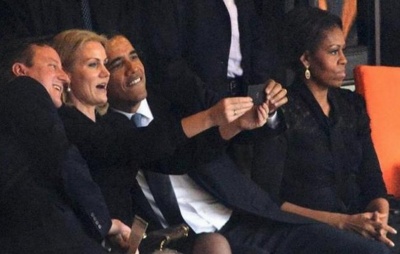
Barack Obama and his wife, Michelle, was joined by the former presidents Jimmy Carter, Bill Clinton and George W Bush. Also attending from Britain were Tony Blair, Gordon Brown, David Cameron and John Major, the UN Secretary-General Ban Ki-moon, and assorted princes and princesses, and celebrities including Bono, Oprah Winfrey and the Spice Girls. Mandela dubbed the last his "heroes" after meeting the pop group 16 years ago.[25]
During Nelson Mandela's memorial service in Soweto, Helle Thorning-Schmidt took a photograph on her mobile phone which immediately made worldwide news. According to the Daily Mirror:
- "A memorial would not normally be regarded as the right place to pose for a ‘selfie’.
- "But a grinning David Cameron and Barack Obama did just that during the memorial for Nelson Mandela.
- "The two leaders squeezed up as Danish Prime Minister Helle Thorning-Schmidt took the snap on her camera phone.
- "Within minutes the photograph of the three leaders posing for the ‘selfie’ went viral on the internet, staking its claim to become the most famous - if controversial - taken so far."[26]
In Zelda la Grange's memoir "Good Morning, Mr Mandela", his former PA said Nelson Mandela would have laughed at the controversy over the "selfie" snapped by David Cameron, Barack Obama and Danish Prime Minister Helle Thorning-Schmidt at his memorial service.
- "They were there, they were there for the right reasons, they paid their respects, whatever else they did, he was very tolerant of people in that way, he wouldn't have seen it as being disrespectful at all," she wrote.[27]
Westminster Abbey Memorial Service
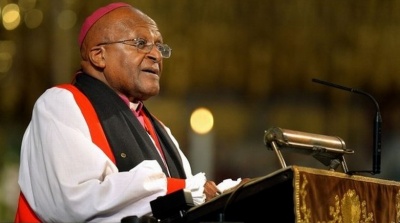
On 3 March 2014 at the Nelson Mandela Memorial Service in Westminster Abbey, Archbishop Desmond Tutu delivered the address, thanking international anti-apartheid campaigners "especially Bishop Trevor Huddlestone, the long-haired Peter Hain, Glenys and Neil Kinnock, and David Steel":
- "Without the anti-apartheid movement, without you extraordinary human beings, Nelson Mandela could so easily have died in prison."
Archbishop Tutu described journeying to Ronald Reagan's Oval Office and to Margaret Thatcher's Downing Street in the 1980s, pleading for economic sanctions to be imposed against the apartheid South African regime, and his pleas "falling on deaf ears". He was "surprised and delighted" when the US Congress passed the Comprehensive Anti-Apartheid Act in 1986, overriding President Reagan's veto.
Another speaker, former Government Minister and anti-apartheid campaigner, Peter Hain said that:
- Nelson Mandela "revered" Britain and never forgot it, even during his harshest years in jail on Robben Island.
- At the time, when the apartheid regime was at its most ruthless, there was a majority in the House of Commons against Mr Mandela and the African National Congress. But "tens of thousands" of British citizens supported Mr Mandela's fight for freedom.
Peter Hain also spoke of the "great privilege" of having known Nelson Mandela and his "impish and mischievous" sense of humour, citing the example of Mandela's "apologising for not attending our wedding in 2003 and saying perhaps I can come the next time".[28]
On 27 February 2014, it was reported that Jacob Zuma was "very busy" and could not attend the Nelson Mandela Memorial Service at Westminster Abbey on Monday 3 March 2014.[29] Mac Maharaj, President Zuma’s official spokesman, said:
- "His diary is always subject to change. This is a very, very busy period."
In South Africa, the change of plan was interpreted as a calculated snub by President Zuma who made no secret of his fury over the 2011 British and American-led invasion of Libya that led to the killing of Colonel Gaddafi, refusing to see Michelle Obama, the US First Lady, when she visited his country some months later.[30] In June 2013, Nelson Mandela reportedly snubbed the visiting President Barack Obama for the same reason.[31]
Event Participated in
| Event | Start | End | Location(s) |
|---|---|---|---|
| WEF/Annual Meeting/1992 | January 1992 | January 1992 | WEF Switzerland |
Related Documents
| Title | Type | Publication date | Author(s) | Description |
|---|---|---|---|---|
| Document:15 times when Jeremy Corbyn was on the right side of history | Article | 29 July 2015 | Paul Simpson | "The important thing is how we bring about peace, not posturing. You do not bring about peace in any part of the world without talking to people you don't agree with." (#SundayPolitics, 19 July 2015) |
| Document:A dissenting opinion on Nelson Mandela | article | 6 December 2013 | Jonathan Cook | |
| Document:Good Liberation Hero-Bad Liberation Hero | article | 9 December 2013 | Stephen Gowans | |
| Document:How Mandela sold out blacks | open letter | 17 July 2012 | Youngster | Bitter criticism of Nelson Mandela for capitulating to the apartheid regime and for failing to ensure that South Africa's mines, banks and minerals were "transferred to the ownership of the people as a whole" as required by the Freedom Charter. |
| Document:Justice for Megrahi - Black's lies matter | Letter | 18 April 2021 | Patrick Haseldine | Don't let Suppressor Black mess up again at the UK/Supreme Court: much better to employ an English lawyer such as Gareth Peirce with a proven track record of success (Guildford Four, Birmingham Six etc.) |
| Document:Mandela: What the Obits Omit | article | 9 December 2013 | Jim Goad | |
| Document:Rebranded revolutionaries: Mandela, Gaddafi and Corbyn | Article | 4 September 2016 | Dewi Asianab | This article is not about Mandela. It is not about Gaddafi, nor is it even really about Corbyn. It is about ideology. That of self determination, the idea that imperialist forces must be repelled and fought at every corner. It is about international solidarity with those who seek refuge from oppressors. It is about three men who share a vast amount in common.<a href="#cite_note-1">[1]</a> |
| Document:Reinstatement in HM Diplomatic Service | Letter | 6 January 1997 | Patrick Haseldine | A plea for reinstatement in the Foreign and Commonwealth Office by "Thatcher's Whitehall Critic" |
| Document:Who Are the Terrorists? | blog post | 18 October 2024 | Craig Murray | "In 1985 the official position of the British state was that the ANC were terrorists and apartheid South Africa were the good guys. In 2024 the official position of the British state is that Hamas and Hezbollah are terrorists and apartheid Israel are the good guys. The state can be wrong." |
References
- ↑ "Blair thanks Mandela Lockerbie effort"
- ↑ "He was put on trial for treason between 1956 and 1961, and was acquitted in 1961"
- ↑ "Mandela Biography"
- ↑ http://articles.chicagotribune.com/1990-06-10/news/9002170271_1_anti-apartheid-activities-gerard-ludi-cia-spokesman-mark-mansfield
- ↑ http://www.newsweek.com/day-mandela-was-arrested-little-help-cia-223935
- ↑ http://fair.org/extra-online-articles/cia-role-in-mandelas-capture/
- ↑ "Letter of 30 March 2001 from Nelson Mandela to Thomas Friedman"
- ↑ "What did you do in the struggle, daddy? The real story of Nelson Mandela and the communists"
- ↑ "Exiles' Cheers Greet Mandela on Zambia" Visit : Africa: The ANC leader leaves South Africa for the first time in a quarter century. He says he wants to meet 'heroes' in the fight against apartheid.
- ↑ "What does Gaddafi's death mean for Africa?"
- ↑ "2013 BBC interview with Neil Kinnock an early supporter of Mandela" BBC1, 8 December 2013
- ↑ "Nelson Mandela at the City College of New York"
- ↑ "Nelson Mandela Release"
- ↑ "Lockerbie: Mandela and Dr John Cameron's report"
- ↑ "Revealed: 2005 Photo of Barack Obama Meeting Nelson Mandela"
- ↑ "What if Mandela was playing 'dead', to avoid meeting Obama?"
- ↑ "DA wants documents on Gaddafi interests"
- ↑ "Obama 'humbled' to visit Mandela's Robben Island jail"
- ↑ "UN security council resolution 1973 (2011) on Libya – full text"
- ↑ "Mystery of British woman linked to Gaddafi's doomed getaway as it emerges son Saif 'is hiding in Sahara'"
- ↑ "SA Mercenaries were misled"
- ↑ "Nelson Mandela back in hospital with lung infection"
- ↑ "Nelson Mandela hospital release reports 'incorrect'"
- ↑ "Nelson Mandela discharged from South African hospital"
- ↑ "Barack Obama and Raúl Castro among speakers at Nelson Mandela memorial"
- ↑ "David Cameron poses for selfie with Barack Obama at Nelson Mandela's memorial"
- ↑ "Nelson Mandela's former PA hits out at 'disgraceful' government handling of his death"
- ↑ "Nelson Mandela memorial service held at Westminster Abbey"
- ↑ "A National Service of Thanksgiving to Celebrate the Life and Work of Nelson Mandela"
- ↑ "Jacob Zuma pulls out of Nelson Mandela memorial at Westminster Abbey"
- ↑ "Obama Meets Privately With Nelson Mandela's Family, Will Not Visit Hospital"
